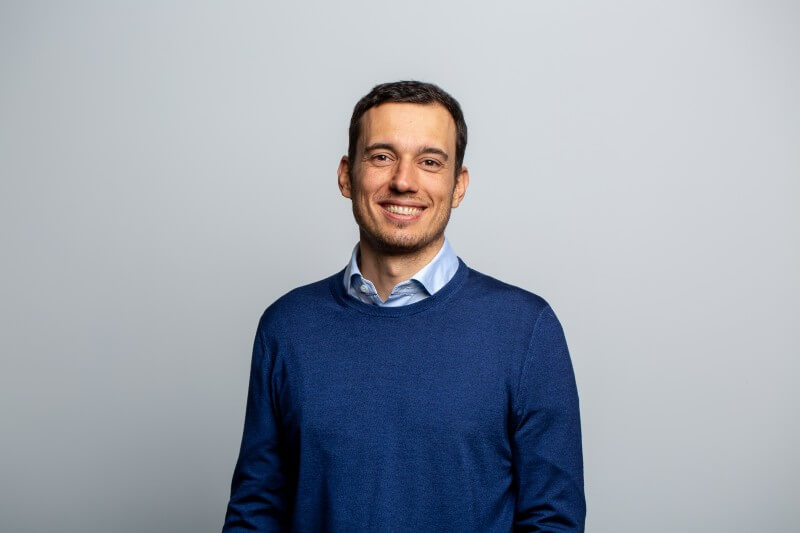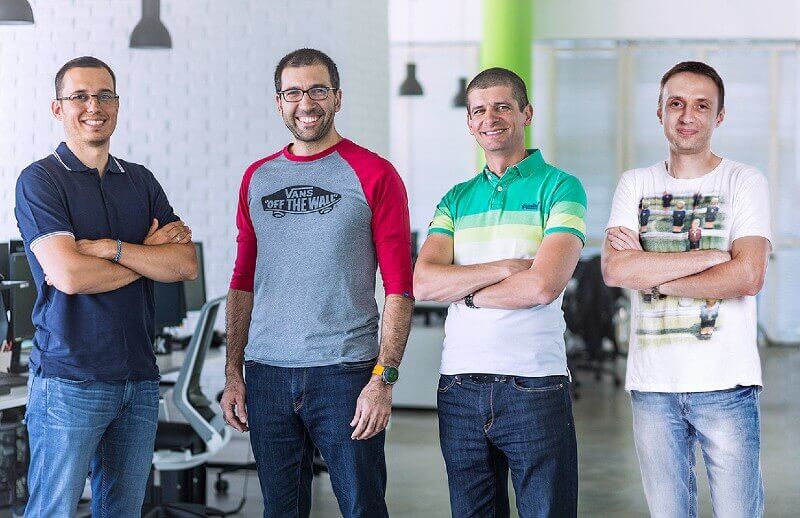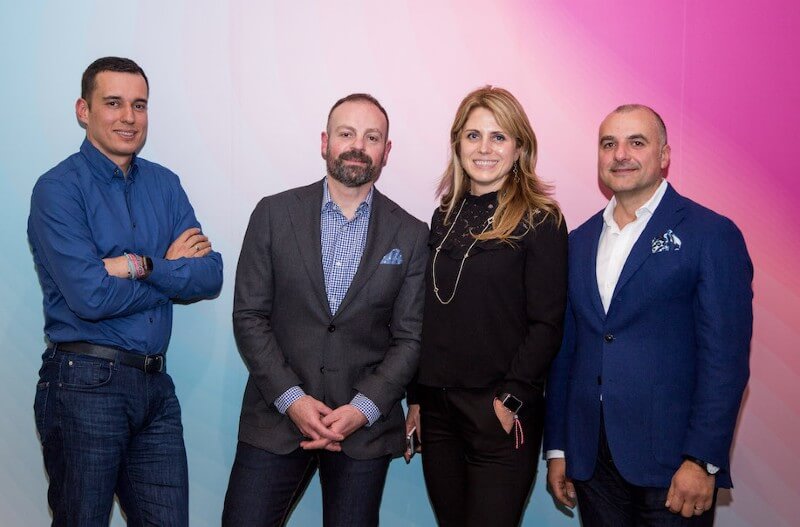
A true measure of success for Vassil Terziev is how many people you have helped achieve it. Although he is better known for his own accomplishments as cofounder of Bulgaria’s most successful tech company, Telerik, Vassil is prouder of what came after the company’s sale, the largest in the country’s history, in 2014 to US company Progress Software. He and the other Telerik founders took on the task of educating the next generation of programmers and tech entrepreneurs through the Telerik Academy Foundation and of fueling the success of innovative businesses through startup incubator Campus X.
Since 2016, when he left the corporate world, Vassil has spent untold hours mentoring company founders and making strategic financial investments through early-stage venture capital fund Eleven Ventures. He is also a founding board member of Endeavor Bulgaria, which promotes high-impact entrepreneurship, and the Bulgaria Innovation Hub, which aids Bulgarian companies’ entry into the US market.
Vassil’s investments are a labor of love that he refers to as his “children.” He proudly speaks of the more than 40 companies established by former Telerik employees, the nearly 50 businesses he has mentored and helped grow, and the Telerik Academy Foundation’s far-reaching impact through the programs of Telerik Academy School, the leading provider of free digital education to youth in Bulgaria.
We spoke to Vassil about his decision to leave the corporate world and dedicate himself to supporting education and entrepreneurship in Bulgaria.
America for Bulgaria Foundation: You are among the people most closely connected with the development of Bulgaria’s startup community. First you showed that starting a tech company in Bulgaria is “mission possible” and then that a Bulgarian company could offer world-class products. Today, you are helping other startups succeed. Why did you change your course, and from a direct participant you became a supporter of the startup community?
Vassil Terziev: One of the reasons is my profound conviction that if you really think you are good at something, you must be able to give what you have achieved as a foundation to those who come after you and let them get better than you — whether you are in sports, business, or culture. Over the years, this has become a much bigger measure of my success.
One day I thought about what would happen if, heaven forbid, I was hit by a car on the sidewalk, and I realized that many of the lessons I have in my head, my knowledge, would be lost. And then this transformation began, and I started wanting to share it. This gave me a lot of meaning as a human being. My desire was to reach as many people as possible so that they could do great things. I suppose that apart from my reflections on how fleeting and short life is, parenting is what shaped my thinking.
No matter how successful you are, if you do not reach many people, you will not achieve a qualitative change. A lot of other people must succeed or be affected for that to happen. Having a billion-dollar company and owning 99% of it makes you very rich, but everything is concentrated in one place. If you have a billion-dollar company where 30 or 40% of the ownership is with the employees, and hundreds of thousands of people are affected, this makes for a completely different change. For me, this long-tail strategy has always been more important — creating hundreds of entrepreneurs, who will then create thousands or tens of thousands of jobs and new generations of entrepreneurs. This is a much longer road to success, but it is much more sustainable. Big companies are born by chance, it is much more important to be able to translate their success into systemic changes.
Our success may not have been the greatest in the universe, but it did at least two things. It showed people in the region that such success is possible here as well. The second important thing is that an awful lot of companies were born. About 50 companies have come out of Telerik so far, including some of the most prominent members of the ecosystem, which I hope will yet make us proud — companies founded by former colleagues and financed by local VC funds, companies that started in Bulgaria and became multinational businesses such as Payhawk, Gtmhub, OfficeRnD, and many others.

One of the untold parts of Telerik’s story is that we had 350 people with a stake in the company, and that’s a lot of people to be positively affected. The second key thing is having a very strong entrepreneurial culture inside the company. When you have an ecosystem that supports all this, success works for everyone and multiplies further. This means that instead of investing in yourself, you need to invest in the environment, in making the land fertile, so that all of us who planted a tree could then have some apples to pick.
ABF: You are working to advance both education, through support for Telerik Academy and the American University in Bulgaria, and entrepreneurship, by mentoring and financially backing early- and later-stage startups, as well as those seeking a global presence through the Bulgaria Innovation Hub. In Endeavor Bulgaria you invest in high-impact leaders who espouse the value of giving back. What motivates this broad support?
V.T.: Everything for me is rooted in two things, and the prosperity of our nation is closely linked to this, too. One is having educated people, educated not only in terms of technical knowledge, but also in terms of soft skills, such as communication, emotional intelligence, teamwork skills, understanding the world around you, how money works, how the human psyche works, game theory — things that help you understand your place in a bigger world. The other thing is purely technical skills. You have to have educated, thinking, free people.
The other part is entrepreneurship — people who create value, who create networks, who are responsible in their success. When you have educated, capable people with an entrepreneurial, free spirit working together, everything starts to happen. All I have to do is to encourage these things. Any initiative boils down to these two things.
My motto in life is “Profits based on the right ethics” — that is, if you want to change the world for the better, you need a combination of resources and the right moral compass. A moral compass without financial resources won’t get you anywhere. The opposite is also true. Concentrating everything in the hands of just one person does not change anything. If you don’t have the infrastructure to create success, the upshot will resemble the mainstream idea of success in 1990s Bulgaria: an extremely well-furnished apartment in a panel building, a 40-inch plasma screen, a hi-fi system, an Audi parked in the mud in front… but you enter the building, and there’s no light in the hallway, everything is covered with graffiti, the elevator doesn’t work, you are always worried that someone will steal your car or slash your tires… The idea is that you have to think about the hallway, the little garden in front, and the floor landing. To change these things, you need a critical mass of people, a critical mass of money, and understanding that you should build and protect.
ABF: What shaped this thinking? What were the important lessons in empathy, in giving back to society, in your life?
V.T.: There is no one single thing that changed me. My parents played a part in shaping my understanding of what it means to be part of a society, to be a citizen of a country, what it means to be responsible. They taught me to look after things, to follow the rules. I have also traveled a great deal, and I have thought about what drives some societies forward, and what holds others back. You see some things that are relatively consistent in those that do better: they work as a team. Individualism does exist, and in some societies like the United States it is very strong, but people there have a sense of belonging to society and having a role to play in that society and of having responsibilities, and that sense develops from early childhood. One of the saddest things in Bulgaria is the nihilism that exists, the lack of respect for institutions or authority. If we do not change this, nothing good awaits us.
ABF: Do you think we can nurture a civic consciousness, and if you do, how should we go about doing it?
V.T.: There are different approaches. The easiest thing is to say that every parent should do it at home. If not the parent, then it’s the teachers’ job, which sounds very easy and convenient… In my opinion, we should be looking for breakthroughs everywhere, and we should fight for every person, including through school programs.
It really pains me that school doesn’t teach kids how to be useful people. What use is it knowing where there are lignite deposits or what the capital of Burundi is — things you can find out through a simple search? Sure, it is good to know, if you have the capacity to remember information like that, but to have this knowledge and not know how to take care of yourself, how people work, what motivates them to do some things and not others… does not lead to anything positive. These are fundamental things that need to change both through private initiative and by having business nudge the state. If we do not reform education and change the trajectory our children are on, whatever we do will have no meaning or impact in 10 to 20 years, simply because people will not have the right mindset when the time comes for them to take over.
ABF: How do you choose what company to invest in? Do you look for “the right mindset” or a certain type of thinking or set of values?
V.T.: I look for two things. One is the company’s growth prospects. To change things, as we discussed earlier, you need success: money, knowledge, connectivity, things that create jobs and raise the bar. So, growth prospects include the presence of a large market, a strong reason why an entrepreneur wants to solve exactly these problems — that is, how well they know the subject matter they are dealing with, how strong the team of founders is, how good they are at hiring. To build a great company, you need to hire people who are at least as good as you, not minions who make you feel good, like the star of the team. They must be equally good at leading and following. I have seen this in all good companies and in growth-minded individuals: they know when to lead and when to follow. The driving force must be the success of the cause, not ego. When the ego is out of the equation, people are more receptive and more likely to listen to the signals of the universe; they adapt faster and never stand still. Lastly, I look for curiosity — that childlike yearning to see what is beyond the hill every day. They should never stop dreaming, being inquisitive, or wanting to get to know the world. These things determine the success of a company.

What they do after they achieve success is also important. What matters is whether they recognize some of these values — that receiving today means that tomorrow they must give back, helping the third generation become better than them, the fourth — better than the third. I need to know that they will be responsible guardians of this knowledge that they are receiving from me and other people, that they will develop it further and will have the responsibility to pass it on to as many people as possible.
The choices you make once you succeed are also important. Will you buy a house in the Bahamas and hide there, thinking, “You figure out your own mess!” Or will you rather say, “Now I have to do something for everyone who has done something for me — teachers, my city, my parents, my neighborhood”? There is no way you will inspire anyone or give them a chance to dream big if you choose to hide in your shell. It is very convenient, but it is not the right thing to do if we really want to live in a better place and are willing to pay the price for it. The place will not change by itself. It’s the same with social change: you have to go through a lot of discomfort and choices.
I have found for myself that despite the discomfort at times, doing something good for someone else gives me the most meaning in life.
ABF: In that regard, would you say that mentoring someone is more gratifying than accelerating their success through financial means, or are the two types of support indelible?
V.T.: I strongly believe in causation. When you choose to work with quality people and you help them, the financials are almost always the easy part, but it is a consequence of the right people doing a good job. My greater investment is in the people, in their knowledge, in passing the baton, and in connecting the dots. The financial part is a derivative of how many quality people you work with, how developed the ecosystem is, how skilled you are at what you do. You see how the new generations of entrepreneurs and of companies are getting better, they are moving faster and faster, they are ever more effective in attracting capital. Within a few short years, the funding companies here are attracting in each round is greater than the exits from a few years ago. And it’s not just a function of a lot of money being available; it’s also a function of the quality that exists here.
ABF: Does that mean that ever more Bulgarian companies offer world-class products? Is this why you created the Bulgaria Innovation Hub — to help those companies place their product on the international markets? Tell us how the idea came about and what the organization’s mission is.
V.T.: What the Innovation Hub is doing, Bogomil Balkansky, me, and a few other people were already doing informally — building a bridge between Bulgaria and Silicon Valley. I know from personal experience how difficult it is to go to the United States, knowing no one, looking for people, having no one know you as an employer, having no network or knowledge of almost anything. The idea was to use our experience and contacts so that people do not have to start from zero and so that we can transfer the knowledge that is there to help Bulgaria.
The idea to create the Bulgaria Innovation Hub arose during a trip to Varna, which was organized by Larry Biehl of the Bulgarian Entrepreneurship Center (BEC). Many things are happening in Sofia, but I believe that we should ignite the spark in other cities as well — in Varna, Plovdiv, Burgas, Ruse, and in the smaller towns. This is the path to success.
ABF: Please continue the sentence: A modern Awakener is…
V.T.: … a person who makes others believe in their incredible potential and gives them the courage to work hard to realize it. I know many people like that. That is why I am optimistic that this country is on the right course.
The America for Bulgaria Foundation proudly supports the work of Telerik Academy School and the Bulgaria Innovation Hub.

